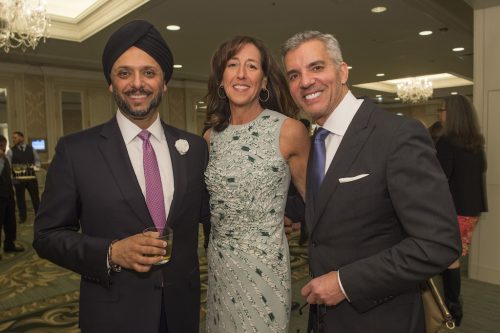
BY JUDY CARMACK BROSS
The Northwestern Medicine Osher Center for Integrative Medicine recently raised $470,000 at a spring benefit bringing together 450 of Chicago’s health enthusiasts, business professionals, and philanthropists at the Four Seasons.

IM Aware Advisory Council Members.

Melinda Ring and Bonnie Fong.

Kanwar Singh, Wendy Berger, and Jim Karas.

Beverly Holcomb. Marigale Walsh, Carrie Lannon, and Molly Trager,.

Victoria Poindexter and Joseph Gayner.
The gala honored the Center’s mission to amplify conventional medicine by practicing innovative, integrative, and personalized care. Funds raised target four focus areas: community, education, research, and their Food as Medicine program. The gala featured health industry pioneer Tieraona Low Dog as its keynote speaker. Founding Director of the Medicine Lodge Ranch in the Santa Fe National Forest, she spoke on the importance of integrative medicine and the latest scientific breakthroughs.

Benefit Keynote Speaker Tieraona Low Dog MD and Benefit Chair Karen Malkin.

Nancy Heap, Margaret Vaile, and Brennan Murray.

John Kane and Nana Adae.

Leslie Glazier, Stephen Miller, and Carolyn Zaslaw.

IM Aware Advisory Council President Jim Karas.
We asked representatives of the Osher Center to tell us more about their work and learned how they integrate acupuncture, massage, diet, exercise, Eastern medicine, and more with Western health care. Their researchers currently study the effect of positive emotion and mindfulness on patients.
What is integrative medicine?
Integrative medicine is both a philosophy of how healthcare can be most effective and a practice that expands our ‘toolbox’ of therapeutic options. It incorporates safe and effective complementary health approaches with conventional medicine. At the Osher Center for Integrative Medicine we take an ‘options first’ approach to empower patients to heal and strengthen their minds, bodies, and spirits through a blend of Western medicine and integrative practices from around the world.
What are some suggestions as to day-to-day steps we can make to improve our health?
- Consider food as your best medicine.
Become aware of the foods you eat and how they affect your mood, energy and wellbeing. Are you giving your body what it needs?
- Look for other modalities to healing.
In addition to a healthy diet, consider acupuncture, meditation, guided imagery, biofeedback, massage, as prevention-care to manage your health and promote healing.
- Abide by a whole-person mentality.
Consider these core areas that impact your health: nutrition, movement, spirituality, relationships, sleep, resiliency in your environment. How satisfied are you in each area?
- Create your vision.
What’s most important to you in your life? Why do you want your health? What do you do for self-care? By focusing on the big picture, daily choices around your health goals will become easier.
What role does nutrition play?
The food you put into your body is crucial to your overall health and wellbeing. The Osher Center team reviews the latest scientific evidence and fully believes food is our greatest revitalizer, preventer, and healer.
You talk about food as medicine—what briefly should we know about this?
The Osher Center has been teaching its medical students about the importance of nutrition for nearly two years. Our program offers students real hands-on experience when dealing with applied nutrition, culinary skills, disease prevention, coaching, counseling, and public health. As part of the program, the Osher Center has teamed up with Common Threads, a like-minded organization devoted to fighting childhood obesity, to bring medical students into Chicago Public Schools in underserved communities to teach children the role of nutrition and wellbeing.
Photo Credit: Randy Belice







